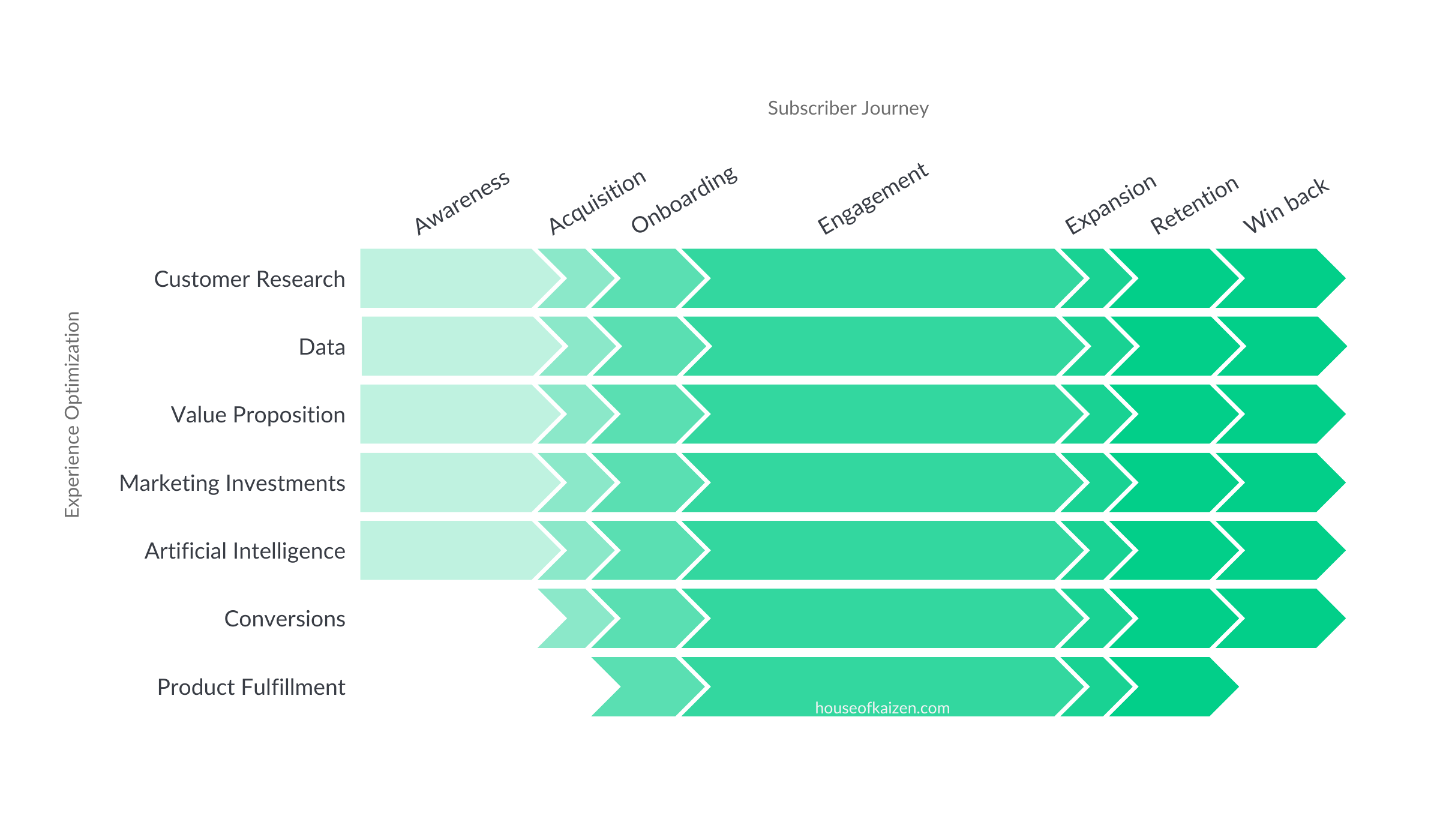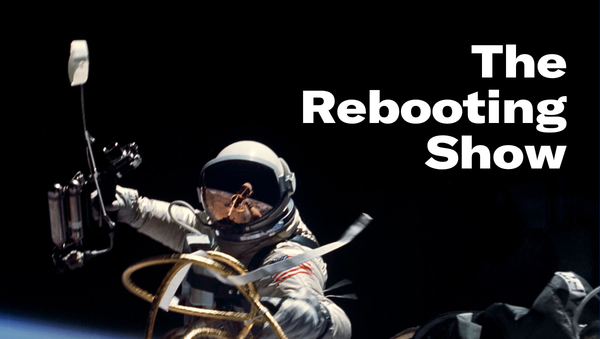Lost in the information space
The media is just one node
I spoke to Jasper Wang of Defector about how it’s building a worker-owned media company that’s a good example of an alternative path for media companies in the more-with-less era. Before that I have an essay on the emergent information space. First up, a message from House of Kaizen.


In the spring, I participated in a workshop House of Kaizen hosted with a group of publishers looking to expand their subscription programs. What emerged was that connecting subscriber journey stages with specific aspects of the audience experience is a powerful toolkit for subscription teams to focus on what has the biggest long-term impact.
As Eric Hellweg of Mozilla’s Pocket. said: "House of Kaizen's framework was an incredibly helpful tool to align the entire organization on where we were hitting our marks and what areas needed attention."
Now this workshop is available on-demand as a self-guided course, or supplemented with 1-1 consultation as you see fit.
Lost in the information space

I’m numb to “trust in media falls to an all time low” stories. This has been a downward trajectory that’s more structural than cyclical, despite periodic blips. The trend line is pretty clear.
The media is a player in decline in an increasingly complicated emergent information ecosystem. The Russian government spoke of dominating “the information space,” which it lumps in with cyber attacks and other methods. To me, it’s all the ways information swirls in the modern world, where anyone and everything can project viewpoints to influence others. The news industry is often at a disadvantage, with legacy systems of editing and fact checking that require the tradeoff of being slow in an information space that’s gone on hyperspeed.
The decentralization many libertarian VC types bray for has already arrived as the information space. The town square concept for Twitter always struck as somewhat apt, so long as it was one of those seedy ones with drunks brawling, weed dealers busking, groups of kids up to no good and so forth.
Elon Musk’s vision for Twitter/X is to be a platform for “citizen journalism,” which is like many revolutionary concepts (socialism, for instance): easy to cheer for in the abstract and impossible to execute in reality. Judging by how Twitter/X has performed during the war in Israel and Gaza, it’s hard to imagine this is what success looks like. If the model UN was boring, this is Mad Max with bath salts. I suppose there’s a place for this, but Musk is right to focus on subscriptions because as something of a power user I can confidently say this product is like chewing tobacco: it’s not for everyone.
Twitter is instead just an ideological combat node in the information space where information and disinformation swirl together, used as a cudgel by either the inflamed or manipulative. Everyone’s a publisher, everyone’s got an agenda, hidden or not. To use Twitter to express your geopolitical views nowadays is akin to playing with fireworks. It can be fun, but you might lose fingers or a hand too. The silence-is-violence mantra is now extended to every issue. The old approach of “better to stay silent and thought the fool than open your mouth and leave no doubt” (Churchill? Twain?) apparently doesn’t pass muster now. You have to take a position, even if you have no hope of truly understanding the issue. Enjoy!
Twitter gets too much attention. It’s an obsession of journalists and young Boomers. TikTok is where Gen Z is, I was told that at Advertising Week so it has to be true. This too is now front and center with the added note of being a Chinese company. It's always going to be a target of geopolitical attacks. The dream of transnational social platforms could end. Governments will become bigger players in the information space. The free-for-all days are over. Facebook and Google pulling news from markets would have been unthinkable a few years ago, but it’s now plausible to even discuss whether Facebook pulls out of the EU altogether over its onerous regulation, now in the form of the Digital Services Act, which makes GDPR look like pat-a-cake.
It’s no mistake that the Israeli government Twitter account was promoting Taylor Swift’s bodyguard had returned to Israel to rejoin the IDF. Subsequently, I came across a Swiftie deconstruction of the story as government propaganda, outlining all the tools used in very relatable language. But then I Googled the story, and it appears true, even though an incorrect correction was appended to the Israeli government tweet through Twitter’s crowdsourced and utterly chaotic answer to centralized content moderation. That in turn was picked up by the Daily Mail because you grab any excuse to shoehorn Swift into any story because traffic. Over on Reddit, moderators locked down a thread calling it propaganda. You can imagine how difficult the information space will be for the average person to comprehend. We might need AI to do our work, because this feels like a full-time job.
If this is a preview, no wonder people are increasingly cutting down on their news consumption. In March 2016, Pew found 51% of Americans claimed to closely follow news. That’s down to 38% now. I used to think you only needed to read The Economist and People to be reasonably informed to talk to nearly anyone. Now I think it would be sensible to confine news consumption to what you get from the elevator ad network. I believe in the creation of a sustainable, equitable and resilient news ecosystem, yet I also sympathize with people who cut down on their news consumption. Much of it isn’t adding much other than aggravation and depression to their lives. I understand the admonition that living an evolved life is to be informed about the world around you, but there are limits, right?
Of course, “the media” has bumbled in the chaotic information space. The New York Times became The Main Character for a couple of days for mislabeling a photo and misreporting the explosion at a hospital in Gaza. The screwup, and subsequent non-apology, became fodder for the NYT to become a handy foil for claims of bias. There’s no going back to being “the newspaper of record,” the Times made a audacious pivot to being a DTC company that shrank its total addressable market. After Trump, there’s no way 40% of the country will believe the NYT, much less pay for it. Instead, it will seek to replace CNN .
News inflames passions. I don’t think many people rage quit Netflix because we don’t need another Stranger Things, these kids are adults by now. News in the information space has become a tribal signifier. That’s why keyword blocklists are complicated, because I understand why a brand would say “for who, for what” to advertising on content that drives people into rage mode. Would you like to consider this luxury watch, now? It makes sense. And yet the reality of a subscription models is they’re slow to grow and hard to maintain. I’m going through the research data we’ve collected from the state of subscriptions survey, and more than half of respondents say their subscription programs have stayed flat or declined this year.
That leads news publishers to often treat news as a loss leader to other more commercially friendly content. This is increasingly hard to make work. News needs subsidies, and robust affiliate operations have served as a handy subsidy for news. But like the pivot to video really being a pivot to Facebook, affiliate for most publishers is central to an SEO strategy. That’s why the generative search experience is scary. (Thanks to Mike McNerny for putting me on a list of people affiliate marketers “might not know but should.” He tells me it’s a compliment.)
The pat answer is that in the chaotic information space brands will matter even more. I think that’s somewhat true, but the brands themselves are going to be smaller, even down the human level that’s often marketed as creators and influencers. There will be a few brands that can operate on political divides. The Times has become something of a lifestyle brand with its successful extension into games. There's a point not too soon in the future that the “other” category on the Times’ earnings surpasses advertising. Display is a losing proposition for many publishers, even with the NYT’s vast trove of first-party data. After all, it’s slinking back into programmatic ad markets it publicly swore off. Big Q4 energy.
The tech industry has long felt maligned by The Media. It was wistful for the days when TechCrunch was slobbering praise on any and every startup. But tech went from those zany kids in a garage to a massive concentration of power. From the tech point of view, the media saw a threat and I guess met at the Media Hall of Justice and hatched a far ranging conspiracy to take down the well-meaning geeks with “hit pieces.” I don’t know, anyone who has worked in any media company would naturally tell you that pulling off such an orchestrated plan is far beyond the capabilities and personalities of those who would need to be involved.
Sometimes this knee-jerk reaction to The Media backfires. Carta CEO Henry Ward decided to react to Business Insider’s and Fortune’s inside-the-toxic-atmosphere article by blasting his entire customer base with a defensive screed that can rightly be termed “wild.” Most customers of course had no idea what the man was going on about. I had never heard of him before this, and now I’m very interested in his chaotic energy. This is the thing about the information space; everyone is a publisher. It’s a real thrill, but there are downsides and sometimes you need an editor, Henry.
My guess is the tech industry will not relent on its “go-direct” mantra. The end of ZIRP ended the vanity projects like the Coinbase CEO hagiography and the notion a VC firm would become the new Wired, but it won’t end tech as a power center projecting its viewpoints into the information space. That’s what Andreessen is doing with his manifestos. There’s a growing network of podcasts that are reliably tech friendly. And let’s be real, three hours of Lex Fridman is more preferable to a CEO than adding quotes to a reported piece. Clubhouse died for a larger cause.
I don’t see how this gets sorted out without technology playing an intermediary role for those who don’t want to join the various filter bubbles on offer and instead choose the a la carte menu. This is a typical progression where a technology innovation creates tremendous change, including negative change, which then requires more technology to mitigate that damage. The promise of personalization has mostly underwhelmed, but the only way a person could navigate the chaotic information system is through a personalized filter tailored to their interests. I would guess many people in that scenario would dial down the “hard news” many say we must immerse ourselves in even if it has no direct impact on our lives. The downside risk of everyone operating in their own filter bubbles might end up better than the neat tribal divisions we have now.
Defector’s alternative path
I fell for one aspect of web3. Thankfully it wasn’t the monkey art. It was the concept of decentralized autonomous organizations. The centralized company has too many tradeoffs from my experience to be fit for purpose in a where economies and societies are going. There needs to be new organizations that develop to foster collaboration but without the blunt force hierarchy, and built in inequalities, of the company.
Of course, like Musk’s dream of citizen journalism, the reality of implementing DAOs was less than inspiring. I wanted to have on Jasper Wang of Defector to discuss how it is is building a media company that to me is one model of what we’ll see more in the future. Defector is worker-owned. Jasper can be kicked out of his role leading the business side if two-thirds of his colleagues vote him off the island.
Defector began as a reaction to Deadspin’s sale to private equity company. No offense to the good people of PE, but it’s a depressing future for the media business if it’s PE directed. I think the more-with-less era will end up favoriting smaller models like the one Defector has. It’s not massive – it will do $4.5 million this year, according to Jasper – but it’s profitable and resilient thanks to a subscriptions model.
In the past era, this would be dismissed as a “lifestyle business.” I hear that a lot. The go-big-or-go-home era led to many strange beliefs that most businesses are big. Most are not. There are 33 million businesses in the United States.
Even bigger companies will take alternative paths. I admire how Nathan Berry is building ConvertKit, taking a different path to a traditional IPO by enabling the company he built to remain independent but allow the employees who built it with him to realize the upside. Too many companies concentrate the gains unevenly. It creates an adversarial dynamic internally that most companies can’t afford in a knife-fight-in-a-phone-booth environment.




